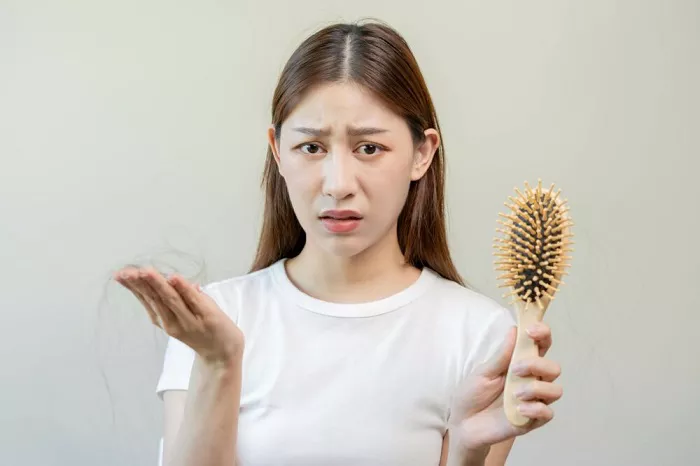Hair loss is a concern that many people face, and the relationship between oil and hair fall is an interesting area to explore. While oil is essential for maintaining healthy hair to some extent, in certain situations, it can seemingly contribute to hair loss. Let’s delve into the reasons why this might occur.
Excessive Oil Production
Sebaceous Gland Overactivity
The sebaceous glands in the scalp produce sebum, which is the natural oil that lubricates and protects the hair and scalp.
However, when these glands become overly active, they produce an excess of sebum. This can lead to a greasy scalp environment. The build-up of excessive oil can clog the hair follicles. When the follicles are clogged, they may not be able to function properly. The hair roots may become weakened as they struggle to receive the necessary nutrients and oxygen.
Over time, this can result in the hair falling out more easily.
Hormonal Imbalances
Hormonal changes in the body can often trigger increased sebum production. For example, during puberty, pregnancy, or menopause, hormonal fluctuations can cause the sebaceous glands to go into overdrive. In men, high levels of androgen hormones can also stimulate more sebum production. These hormonal imbalances not only lead to excess oil but can also directly or indirectly affect the hair growth cycle. The altered hormonal environment may disrupt the normal growth, resting, and shedding phases of the hair, ultimately causing more hair to fall out than usual.
Use of the Wrong Oils
Heavy or Non-Biocompatible Oils
Some oils are heavier and may not be easily absorbed by the scalp and hair. For instance, mineral oils or some synthetic oils can coat the hair shaft and scalp in a thick layer. This coating can prevent the scalp from breathing properly and can weigh down the hair, making it more prone to breakage. Additionally, if the body does not recognize or have a proper metabolic pathway for a particular oil, it may cause an immune response or inflammation in the scalp. This inflammatory reaction can damage the hair follicles and lead to hair loss.
Allergic Reactions to Oils
Some individuals may be allergic to certain oils or the additives in them. When applied to the scalp, an allergic reaction can occur. This may manifest as itching, redness, and swelling of the scalp. The constant scratching due to the itch can further damage the hair follicles and cause the hair to fall out. Common oils that can cause allergies include certain essential oils, especially if not properly diluted or if a person has a specific sensitivity to them.
Poor Hygiene and Oil Buildup
Lack of Regular Washing
If oil is left on the scalp for extended periods without proper cleaning, it can accumulate dirt, debris, and bacteria. This buildup creates an unhygienic environment on the scalp. The bacteria can multiply and cause infections or inflammation.
The inflamed scalp is not conducive to healthy hair growth, and the hair follicles may become damaged, leading to hair loss.
Moreover, the accumulated oil and dirt can make the hair strands more brittle and likely to break off at the roots.
Inadequate Washing Techniques
Even when people wash their hair, if they do not use the right techniques, the oil may not be completely removed. For example, using too little shampoo or not rinsing thoroughly can leave behind residual oil. This residual oil continues to affect the scalp and hair, potentially leading to the same problems as if the hair was not washed at all. Additionally, using hot water for washing can strip the scalp of its natural oils too quickly, causing the sebaceous glands to produce even more oil in response, creating a vicious cycle.
Underlying Medical Conditions
Seborrheic Dermatitis
This is a common skin condition that affects the scalp. It is characterized by excessive oiliness, along with flaking, itching, and redness. The overproduction of oil in seborrheic dermatitis is often accompanied by an inflammatory response. The inflammation can damage the hair follicles and lead to hair loss. The exact cause of seborrheic dermatitis is not fully understood but may involve factors such as genetics, hormonal changes, and the presence of certain fungi on the scalp.
Hormonal Disorders
Conditions like polycystic ovary syndrome (PCOS) in women and androgenetic alopecia (male pattern baldness) in both men and women can be associated with hormonal imbalances that lead to increased oil production and hair loss. In PCOS, for example, there is an excess of androgens, which can cause the sebaceous glands to produce more oil. At the same time, the hormonal changes can also directly affect the hair follicles, leading to miniaturization and eventual hair loss.
Conclusion
In conclusion, while oil is necessary for maintaining healthy hair to some extent, various factors related to its production, usage, and underlying scalp conditions can cause it to seemingly contribute to hair loss. Understanding these factors and taking appropriate measures such as maintaining proper scalp hygiene, using the right oils (if using them at all), and addressing any underlying medical conditions can help mitigate the issue of oil-induced hair loss. If you are experiencing significant hair loss related to oil or any other reason, it is advisable to consult a healthcare professional or a dermatologist for a proper diagnosis and appropriate treatment options.

